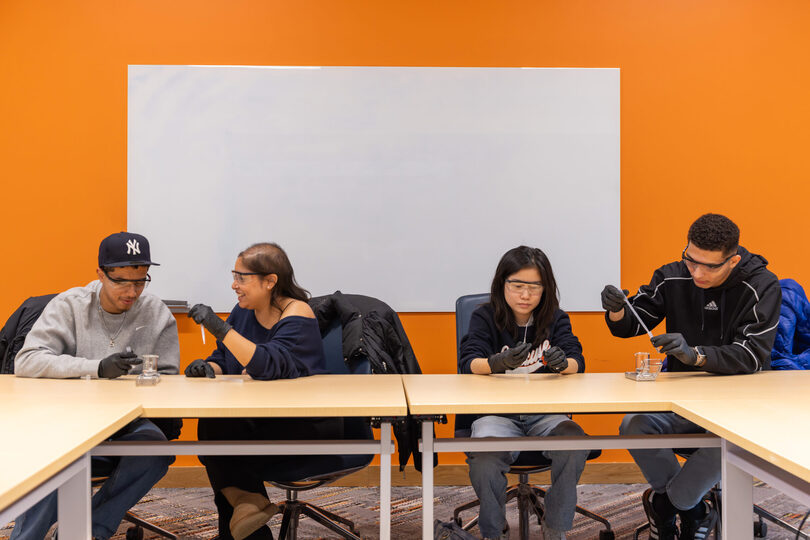Fragrance Club wafts handmade perfumes, nostalgia through niche community

Sophomores Marc Rhodes and Sam Dultsin started Fragrance Club last semester. Less than a year later, it's grown to a 300-member registered student organization. Alicia Hoppes | Staff Photographer
Get the latest Syracuse news delivered right to your inbox.
Subscribe to our newsletter here.
Four and a half grams of helional, three grams of dihydromyrcenol and 1.5 grams of ambroxan. Mixed together, these chemicals create the base recipe for an oceanic scent. This aroma isn’t crafted in a lab in a major city, but right on Syracuse University’s campus.
“Fragrance Club is a way for people to have hands-on activities with their friends, or just something different to do,” Ta’Nasia Coleman, the club’s workshop coordinator, said. “It’s something interesting and something that you can physically take away from the workshop.”
Sophomores Marc Rhodes and Sam Dultsin started Fragrance Club last semester. One of the only clubs of its kind on the East Coast, Rhodes, Dultsin and two other students created the organization as a space for perfume enthusiasts on campus. Less than a year later, the club has grown to a 300-member organization. They host workshops on the art and science behind perfumery, with an upcoming event this Friday.
Since fragrances are a niche area of interest, Rhodes and Dultsin spent their first semester tabling to gather interested members and securing funds to hold workshops. Fragrance Club needs more resources than other SU clubs in order to operate, Dultsin said, so they spent the first semester figuring out financial logistics.
Fragrance Club became an official registered student organization and was able to secure funds for its next step: holding workshops for members to learn about the process and ingredients behind fragrance making, as well as creating their own perfumes from scratch.
Before holding a workshop, Rhodes, Dultsin and Coleman first settle on what accord — a blend of ingredients that create a singular scent — they should make. For this week’s workshop, the trio decided on an aquatic accord, a scent that brands like Cool Water by Davidoff and L’Eau d’Issey by Issey Miyake are known for, Rhodes said.

Members of Fragrance Club’s mock trial test out different chemical combinations to create the perfect scents. The club hosts mock trials before every official workshop. Alicia Hoppes | Staff Photographer
The right chemicals and measurements are essential for long-lasting fragrances, Coleman said. Precision is key — Rhodes and Coleman put their computer engineering and aerospace engineering majors to use. While Dultsin coordinates materials and event marketing, Rhodes and Coleman work behind the scenes to research and test the chemicals to see if they work well together.
In their accords, Rhodes and Coleman look for enduring scents and balanced perfume notes without overpowering smells. Since fragrances are subjective, the club tests an accord through mock trials before holding official workshops.
“The test subjects can tell us what notes they smell,” Coleman said “They can give us good feedback on what to do for the next trial or the next workshop.”
After the club’s mock trials, which host around four or five people who test the scents, Rhodes and Coleman spend several days tweaking the formula before the workshop. With limited resources, workshops can only feature 20 participants. The workshops fill up quickly; members often have to rotate with others so everyone can participate.
While many choose perfumes or colognes based on personal preference, it’s about more than just smelling good, Rhodes said. For Dultsin, shopping for a fragrance is like shopping for clothes; you have to pick one for the occasion.
“(Fragrances) are like choosing how to style this necklace, or, if these boots match with the pants. It’s the same thing with colognes,” Dultsin said. “(Fragrances) are a way to express myself. Whenever I look at my colognes and decide what I want to wear today, it’s like, ‘What do I want to give off for today?’”
Fragrance Club hopes to expand perfumery into other mediums like soaps, and hold events like aroma therapy, aiming to cater to a larger SU population. Rhodes, Dultsin and Coleman also want to bring perfumers from the industry to speak to members of the club. The club already partnered with cosmetics company Avon last semester, sending over samples for club members to try.

Creating scents is both a science and an art. Four or five people test the scents before official workshops, giving feedback on smells and potency. Alicia Hoppes | Staff Photographer
“Being a perfumer is a really niche thing to do, and it’s an unexplored job that people don’t really think about,” Rhodes said.
Perfumery is constant trial and error, Rhodes said. An overpour of a chemical can lead to either a crisp smell or a potent one.
Like looking at painting, perfumery is all about trying to understand where the scent is coming from, why it’s being made and how it makes a person feel. For Coleman, fragrances are all about evoking certain feelings and nostalgia.
“There’s an Italian perfume that I got for my grandma, and she teared up a little bit because she said it reminded her of her mom,” Coleman said. “Evoking emotions, this club can definitely do that for some people.”





